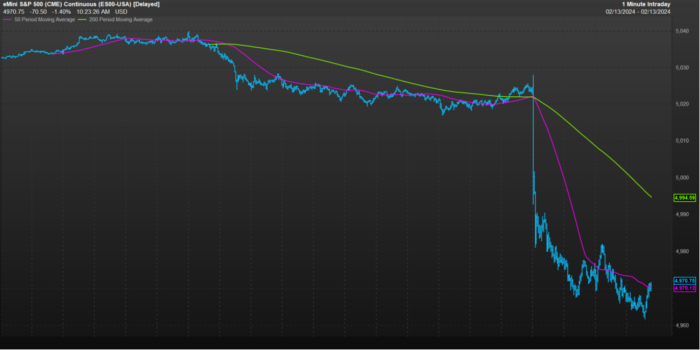Unlock the Editor’s Digest for free
Roula Khalaf, Editor of the FT, selects her favourite stories in this weekly newsletter.
The data underpinning today’s surprisingly hot US inflation report raises one interesting question — well, interesting to Alphaville, at least.
What is a “transportation service”?
It’s one of just a few services costs that drove an acceleration of consumer prices in January: Shelter costs, transportation services and medical services. The latter two are considered “core services”, because rent costs can be sticky and Americans don’t necessarily pay increases in owners’ equivalent rent in real time.
The pick-up in services inflation (and core services inflation) certainly has stock-market bulls a little freaked out:

Yet a closer look at the data shows that a recent FTAV favourite is responsible for most of the rise in transportation-services costs: car insurance!
The cost of insuring an automobile has climbed nearly 21 per cent over the past year, according to the BLS. It rose nearly 2 per cent in January without seasonal adjustments. The analysts at Employ America have also highlighted auto insurance’s role in the recent gap between the CPI and the Fed’s favoured PCE indicator — and reckon that part of the gap could very possibly narrow in the future, writes Skanda Amarnath:
Motor vehicle insurance has been a subtly large contributor to the Core CPI vs PCE wedge in the last 6 months. The PCE measure follows a different methodology that doesn’t show the same persistent upside that the CPI measure shows. Nevertheless, some local acceleration seems plausible given the regulatory changes occurring at the state level to permit insurers to charge higher premiums.
Motor-vehicle maintenance and repair costs, which feed into insurance costs for obvious reasons, are up 6.5 per cent in a year, and 0.8 per cent for January. Maintenance costs (+1 pc) grew faster than repairs and body work (+0.5 pc and +0.7pc) for the month.
As for the insurers themselves, it looks like profit pressures are lifting. Regulators in New Jersey, New York and California have approved some rate increases that insurers were lobbying for during their very-bad-no-good years, according to Allstate’s latest quarterly earnings report on Feb 8. And it has plans to pursue more:
. . . since 2022, the Allstate brand implemented rate increases of 33.3%, which included 16.4% in 2023 and 6.9% in the fourth quarter driven by the recent approvals in California, New York and New Jersey. National General implemented rate increases at 10% in 2022 and an additional 12.8% in 2023. Looking forward, we will pursue rate increases in 10 states to improve margins and in other states to keep pace with increases in loss costs.
Used-car costs have, in contrast, declined. They were down 3.7 per cent in January, while new car costs were mostly stable (up 0.3pc).
Notably, economists at Goldman Sachs on Monday predicted an acceleration in transportation-services costs as part of a “January effect”:
First, we expect a temporary boost to core CPI from start-of-year price increases, which we expect to be most pronounced in the prescription drugs, car insurance, tobacco, and medical services categories.
But none of this means the Fed will write off the strong report, especially in light of recent blowout jobs data. In a Tuesday note about the CPI report, GS’s Jan Hatzius wrote that the surprising strength in owners’ equivalent rent could signal the housing market is rebounding now that mortgage rates are lower:
. . . despite a further slowdown in the rent category (+0.36% vs. +0.39% in December), the large and persistent owners’ equivalent rent category (OER) jumped to a 9-month high of +0.56% (largest gap vs. rent component since 1995).
While the OER measure has been particularly volatile recently, we note the possibility that the January strength reflected the rebounding single-family housing market, which the OER sample was reweighted to emphasise starting last year.
In other words, that double-digit-basis-point jump in the 2-year Treasury yield — and the slower pace of rate increases priced into fed funds futures markets — might be warranted.
Further reading:
— What’s going on with US car insurance?
— Unhedged episode on auto insurance
— Allstate is a BBB credit now
— The insurance storm continues
— Car insurance! Again!










